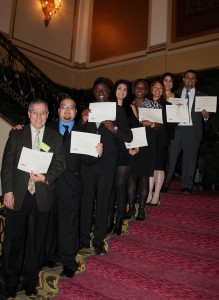
Where on earth is Mauritania? Seven students from the CSU Dominguez Hills Model United Nations program know exactly where it is – and much more. They represented the west African nation, acting as delegates in mock sessions during the Harvard National Model United Nations conference (HNMUN), held in Boston, Mass. on February 16 through 19.
Founded in 1955, only a decade after the creation of the United Nations, Harvard National Model United Nations is, according its organization’s website, the largest, oldest, and most prestigious conference of its kind. Staffed by Harvard College undergraduates, HNMUN attracts more than 3,000 students and faculty from colleges and universities worldwide to simulate the activities of the United Nations, offering an opportunity for students to experience the challenges of international negotiation and diplomacy.
“We were invited to attend the largest Model United Nations conference in the U.S. For us, this was a major accomplishment,” said Hamoud Salhi, chair of the Negotiation, Conflict Resolution & Peacebuilding program and associate professor of political science, who helped prepare students from his Model United Nations class (Pol Sci 339).
During the conference students Aubrey Abuana, Heriberto Bautista, Yousef Abu-Ghazaleh, Arnaud Lukombo, Pamela Prieto, Timne Randolph, and Mahak Romez-Hiaksari represented the Islamic Republic of Mauritania, a member state of the League of Arab States, which gained independence from France in 1960, and shares borders with Algeria, Mali, Senegal, and the Western Sahara.
During the UN simulation course taught by Salhi, students adopted a country that they would represent at the HNMUN. Throughout the course, students learned how to conduct research about the history, economics and politics (through position papers) of their adopted country, and how to represent it as delegates.
The students headed four committees: the Disarmament and International Security Committee, the UN Human Rights Council, the Special Summit on Non-Discrimination, and the UN General Assembly Legal Committee.
The students researched, debated, drafted and passed resolutions on a variety of topics, including terrorism, the role of information and telecommunication in reactionary movements, the third human rights generation, the rights of non-migrant workers, revision of the Geneva Conventions in the role of war, and UN recognition of sexual minorities.
Salhi selected the seven students based on their excellent representations at past Model UN competitions, as well as their leadership skills, academic standings, public speaking skills, and diplomatic negotiations abilities. Preparation for this competition began in October, continued throughout winter break, and ended just before the conference started.
Abu-Ghazaleh, head delegate of the student group, said that providing top-performing students with a greater and more rewarding challenge, was one of Salhi’s priorities for coordinating the group’s participation in the conference.
“Having such a supportive leader not only propelled our success as a team, but also made this conference a fun and unforgettable experience. It really was a phenomenal opportunity,” said Abu-Ghazaleh. “I hope that CSUDH will continue to support it as a method of rewarding and further motivating its top students. I am very proud to have led such a phenomenally dedicated group.”
The CSU Dominguez Hills students competed with student-delegates, representing 40 universities across the U.S. and from countries including Brazil, France, India, Saudi Arabia, and Venezuela. According to Salhi, major U.S. and Ivy League schools were in strong attendance, among them Yale University, Brown University, Princeton University, University of Chicago, George Washington University, UC San Diego, and Florida International University. Dominguez Hills, Fullerton, and Long Beach were the only CSU schools attending.
While most delegate awards were won by the major U.S. and international universities, CSU Dominguez Hills students worked well with the other delegates and performed extremely well representing Mauritania, Salhi said. All received certificates of recognition as participants in the Harvard National Model United Nations conference.
Students in the Model UN class will get a second opportunity to act as UN delegates later this month when they compete with other southwestern universities in (Western Collegiate Model United Nations) WestMUN XX from March 29 to 31 at Santa Barbara City College.